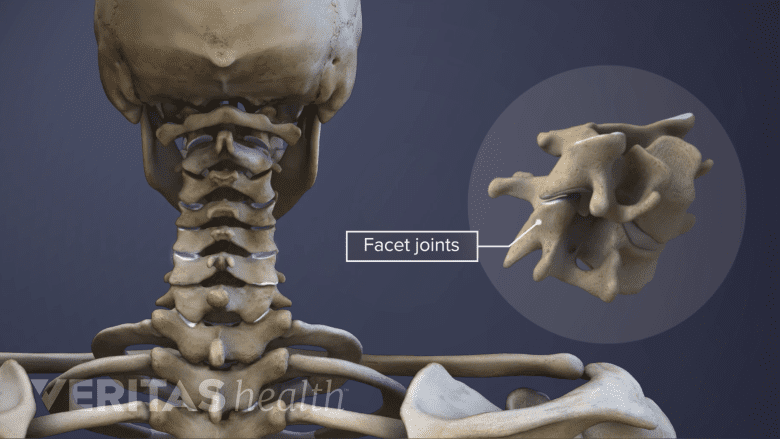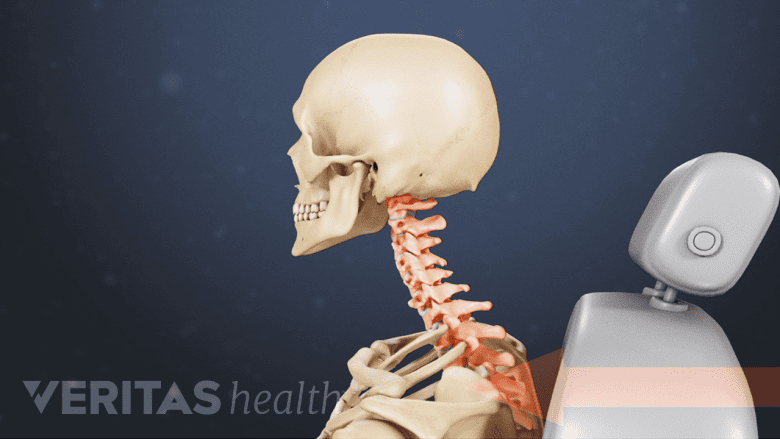Unlike most stiff necks, which can typically be treated with self-care, a stiff neck that follows a significant accident or collision needs to be examined by a medical professional. Neck pain and stiffness that results from a high-energy impact is more likely to be accompanied by a serious underlying medical condition—such as a concussion or joint damage—and may require medical attention to achieve a good recovery.
Many factors can determine the type of neck injuries sustained after an accident, including the neck’s strength and stability before the accident, as well as the angle and speed of the collision. For example, a person with weaker neck muscles or spinal joints that have already begun to deteriorate, may be at an increased risk for more severe neck injuries when involved in an accident.
In This Article:
Injuries That Can Accompany a Stiff Neck After Direct Trauma
While a stiff neck after an accident may stem from a muscle strain or ligament sprain, it could also be accompanied by a more serious injury:
Herniated disc

A herniated disc occurs when inflammatory proteins from a disc's inner core leak out.
A cervical disc that provides cushioning between adjacent vertebrae in the cervical spine can become damaged and leak inflammatory proteins onto nearby structures, such as nerve roots or muscles.
See Cervical Herniated Disc Symptoms and Treatment Options
Facet joint damage

Increased facet joint friction may cause neck pain and stiffness.
A pair of facet joints allow for limited movements along the back part of adjacent vertebrae. If the joint capsule or cartilage becomes damaged, joint inflammation may lead to neck pain and stiffness.
Watch: Facet Joint Anatomy Animation
Cervical spine fracture
The cervical spine is comprised of seven vertebral bones stacked on top of each other to support the head and protect the spinal cord. If a vertebral bone in the cervical spine sustains a fracture but does not cause an immediate spinal cord injury or noticeable spinal instability, the injury might not be noticed until more significant symptoms start to present later, such as pain, stiffness, or radiating pain or weakness down into the arms or legs. If a cervical spine fracture goes undiagnosed, it could potentially lead to a worse injury, such as paralysis of one or more limbs, or other complications. It is also possible for a fracture to eventually result in a bone infection, called osteomyelitis, which is another cause a stiff neck.
Watch: Spinal Compression Fracture Video
Concussion
If the cervical spine sustains an injury during an accident, the brain has also likely experienced trauma. If a concussion has been sustained, one or more of the following symptoms are likely to be experienced: headache, dizziness, confusion, sensitivity to light, or other changes to mental state, such as being easily agitated or fatigued.
Read more about Concussion Symptoms on Sports-health.com
When a Stiff Neck from Direct Trauma Needs Medical Attention

Prompt medical attention is crucial for whiplash injuries to prevent possible complications.
Sometimes an accident causes obvious pain and damage that requires immediate medical attention, such as a trip to the emergency room. However, it is common for people to sustain a serious injury in an accident but feel surprisingly fine until hours later when a stiff neck or other symptoms might develop. Some common examples of accidents that require a visit to the doctor if a stiff neck or other delayed symptoms develop, include:
- Auto accident. Even an apparently minor fender bender that does not involve significant car damage can potentially cause a whiplash injury for the passenger(s) hit from behind.
- Fall from height. Falling from a ladder or down steps, even from a relatively low height, has potential to cause serious bodily harm or concussion.
- Recreational accident. Activities such as biking, downhill skiing, snowboarding, and water skiing are all typically performed at high speeds and capable of causing serious injuries, even if symptoms do not present immediately.
- High-impact sports collision. Some sports, such as football and hockey, routinely involve players crashing into each other. Any type of hit to the head or neck region that leaves a player slow to get up should be evaluated by a qualified medical professional. Furthermore, a player with a stiff neck or other significant pain is not advised to continue the activity until being cleared by a doctor.
If neck pain or stiffness is accompanied by any tingling, numbness, or weakness that goes into the arms or legs following a significant accident, the patient may need to limit movements and wait for medical personnel to evaluate and stabilize the neck before transporting to a medical facility.

